Massachusetts is working overtime to become a bike-friendly state.
In Boston, they’ve gone from “Worst” to “Future Best” Bike City in Bicycling Magazine and former Olympian turned bike czar Nicole Freedman was recently named a “Bostonian of the Year” by the Boston Globe.
Now, momentum seems to be rolling statewide with passage this week of the “Bicyclist Safety Bill” — a major set of laws that puts bike safety front and center. With our legislative session currently underway, I thought it would be interesting to compare the new Massachusetts bill with what’s already on the books in Oregon.
When Oregon was ranked 4th most bike-friendly state by the League of American Bicyclists last year, one of our Achilles Heels was our weak bike laws. We ranked 27th in the Legislation category.
Below is a summary of some of the new laws, and how they compare to Oregon:
- Changes for Bicyclists
1. Safer Signaling : Bicyclists were already required to use hand signals when stopping or turning, but now it is clear that you are not required to signal when you need both hands on the handlebars, such as when operating the brakes, shifters, or steering.
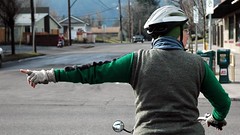
to use hand signals. It’s still law in Oregon;
with exceptions.
In Oregon, it is required by ORS 814.440 to use hand signals “at least 100 fee before executing the turn”. However, there’s an exception in the law that states that a person is not in violation of the offense if “circumstances require both hands be used to safely control or operate the bicycle.”
2. Riding Two Abreast Permitted : Bicyclists are no longer restricted to riding single file at all times. You can now ride two abreast (two bicycles, side-by-side), except that you still have to help faster vehicles to pass. So stay in single file when cars need to get by! On multi-lane roads, you can ride two abreast, but all the cyclists in your group must stay in one lane (which will usually be the right-hand lane unless you are making a left turn).
ORS 814.430 says that a person operating a bicycle in a bike lane must ride “as close as practicable to the right curb or edge of the roadway.” There are several exceptions to this, one of which is, “when operating a bicycle alongside not more than one other bicycle… in a manner that does not impede the normal and reasonable movement of traffic.”
Changes for Motorists
3. Don’t “Door” Bicyclists : Motorists (and their passengers) can now be ticketed and fined up to $100 for opening car or truck doors into the path of any other traffic, including bicycles and pedestrians.
ORS 811.490 says that it’s illegal to open a car door into the bike lane, “until is is reasonably safe to do so” and until it can be done “without interference with the movement of traffic…or with bicycles on sidewalks or shoulders.”
4. Don’t Cut Off Bicyclists After Passing : Motorists used to be required only to stay a safe distance to the left of a bicyclist (or any other vehicle) when passing; now, motorists are also prohibited from returning to the right until safety clear of the bicyclist.
5. Don’t Squeeze Bicyclists in Narrow Lanes : If the lane is too narrow for a motorist to pass a bicycle (or any other vehicle) at a safe distance while staying in the lane, the motorist must use another lane to pass, or, if that is also unsafe, the motorist must wait until it is safe to pass.
Oregon passed a safe passing law in 2007. ORS 811.065 states that motor vehicle operators must pass with room “sufficient to prevent contact with the person operating the bicycle if the person were to fall into the driver’s lane of traffic.”
The Oregon law has some major exceptions — like a minimum speed of 35 mph and it doesn’t apply to roads with bike lanes — which make it only applicable in rural situations. (There is interest brewing to create a local city ordinance that would beef up the passing law.)
For a thorough analysis of Oregon’s passing laws as they pertain to bicycles, read more from lawyer Ray Thomas.
6. Don’t “Right-Hook” Bicyclists : A “right-hook” is when a motorist makes an abrupt right turn too close to a bicyclist, causing the cyclist to crash or make an emergency maneuver to avoid crashing. Motorists are now prohibited from making abrupt right turns at intersections and driveways after passing a cyclist.
In Oregon, motor vehicle operators must “yield to a rider in a bicycle lane” (ORS 811.050). They are also not allowed to travel in the bike lane. To turn right, car drivers are supposed to go all the way to the intersection before making the turn (as opposed to rolling up in the bike lane).
8. Motorists Liable for Hitting Bicyclists Riding to the Right : Bicycles, unlike other vehicles, are permitted to ride to the right of other traffic (e.g., on the shoulder), and motorists are not permitted to use this fact as a legal defense for causing a crash with a bicyclist.
Bicycles in Oregon are also allowed to pass on the right (if they can “safely make the passage under existing conditions” according to ORS 811.415), but I’m not aware of any specific language in our law that deals with motorist’s liability if someone on a bike were to be hit.
Police Training and Enforcement
10. Police Training : Police recruits are now required to receive training on the bicycle-related laws, bicyclist injuries, dangerous behavior by bicyclists, motorists actions that cause bicycle crashes, and motorists intentionally endangering bicyclists. The training is optional for in-service training of experienced officers.
There is nothing in Oregon law that requires special bike-law training for Police. On the local level, the Portland Police Bureau has paid for some officers to take specialized courses on bike crash investigation.
Other Changes
12. Bicycle Registration Repealed : The bicycle registration law permitted any city or town to require residents to register their bicycles, to require bicycle rental businesses to register their bicycle fleets, and to require bicycle shops to file reports identifying the purchaser of every bicycle. The registration law was not being used or enforced anywhere in the state.
There is no bicycle registration law in Oregon. Attempts have been made locally by the BTA, but, like it seems was the experience in Massachusetts, programs like this never seem to pencil out budget-wise.
With our current legislative session underway, we’ll be paying close attention to all the bike bills being considered. Stay tuned for more legal coverage in the months ahead.
— For an excellent guide to bike law in Oregon, download a free copy of Ray Thomas’ Pedal Power.

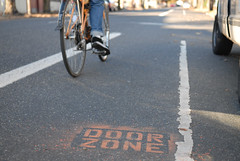
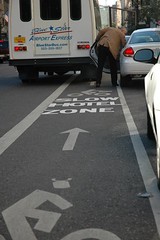

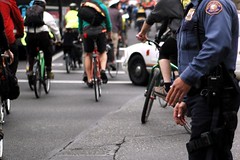
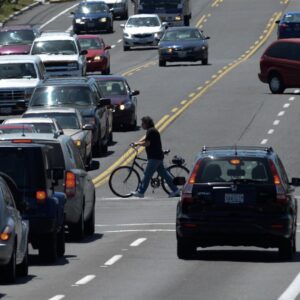



For more on bikes and the law, check out the BTA’s website for the legal briefs done usually every other month at their office.
http://www.bta4bikes.org
Next meeting 2/18/9 at 6pm.
Get a FREE bound copy of Pedal Power there.
I’m quite envious of this little gem:
10. Police Training : Police recruits are now required to receive training on the bicycle-related laws, bicyclist injuries, dangerous behavior by bicyclists, motorists actions that cause bicycle crashes, and motorists intentionally endangering bicyclists. The training is optional for in-service training of experienced officers.
Jonathan: With respect to safe passing distance, I think it is important to remember that any vehicle overtaking another vehicle is required under ORS 811.410 to maintain a safe distance. I believe that ORS 811.065 defines what that safe distance is in situations in which there is no bike lane and the passing vehicle is exceeding 35 mph.
i wish the city put in those door zone stencils everywhere… and maybe some “Annoying teenagers throwing beverages from parked cars Zone” stencils too…. maybe that one is too wordy…?
Oh, how nice it would be to get back to talking again about making progress on this stuff in Our Fair City. Five points:
1. Donna (#2) is spot-on. Police training is the glaring omission in Oregon, especially in Portland. I have had numerous conversations with PPB officers in which it has been clear that they do not know the traffic laws (you know, the ones they’re supposed to enforce) that deal with bikes, and how the laws generally apply to bikes. This is perhaps the single most important thing we can change here in Oregon.
2. Dooring is a huge and well-known hazard for cyclists. See the letter I wrote to the City Council, Chief of Police, and PSU President in which I detail the facts on this. Any bike lane intentionally placed in such a hazard zone demonstrates a profound lack of understanding about how to make bicycling a viable transportation option and creates a grave risk for cyclists. This practice has got to stop. This should be a major advocacy issue. Hello, BTA?
3. There is no single, concerted effort to study bike-related laws in Oregon and recommend ways to change them to remove barriers to cycling, at least to my knowledge. An Oregon Bicycle and Pedestrian Law and Policy Institute or think tank – or at least some more focused effort – is something that would serve our city and state well.
4. Doug (#3), see my guest editorial (linked in the story above, on a passing distance ordinance), on why the “safe distance” standard for passing is weak. The short version is that it relies to much on judicial discretion and the bias bicyclists often face in the traffic law system.
5. I’ll leave you with this: People think Portland’s so great for bikes, and it’s definitely great by contrast to certain other places. But, make no mistake, there are plenty of more progressive parts of this great nation. And they *will* pass us in terms of progress on bike issues if we don’t start working smarter here in PDX and OR.
Re: #2 (riding two abreast):
I like the Oregon law better. When the lane is too narrow to safely share with cars, riding two abreast can give riders more security to ensure that motorists pass at a safe distance. As an LCI instructor, I encourage my students to aggressively claim lane position if they are in a position where sharing the lane with a passing motorist would constitute a risk. I think the Oregon wording makes it less unambiguous that this is a legal as well as prudent practice.
Bike safety has little to do with laws; indeed following the law can be risky.
Laws and law makers typically follow; they do not lead. The leaders in the “bike movement” in Portland are all the people who get out and bike, have fun doing it, show it works, assert on daily basis their right to the street, and like, BikePortland, tell their story. Safety is in numbers. The more people who bike, the more drivers who sometimes bike, the more we are seen on our bikes, the safer we are.
The missouri law says that bicyclists should as near to the right side of the roadway as SAFE, exercising due care when passing a standing vehicle (door zone) or one proceeding in the same direction EXCEPT when avoiding hazardous conditions, when making a left turn or when the lane is too narrow to share with another vehicle.
I’m reciting this from memory so no doubt I missed a word or two but I think its a nicely written law that gives bicyclists the legal right to claim the middle of a narrow lane.
I
“There is no bicycle registration law in Oregon. Attempts have been made locally by the BTA, but, like it seems was the experience in Massachusetts, programs like this never seem to pencil out budget-wise.”
BTA are you listening?
no license
no tax
no registration
also no mandatory helmet law
Item #12 is interesting.
In Massachusetts the repeal of bike registration laws was seen as pro-bike. Here I expect most cyclists would agree with that, yet the BTA was sponsoring just the opposite. What gives there, JM? You say budget pressure makes it a non-issue in OR and perhaps in MA as well, though I don’t see any evidence the repeal was motivated by budget. What is the pro-bike position? Was the BTA move a “throw them a bone” type deal?